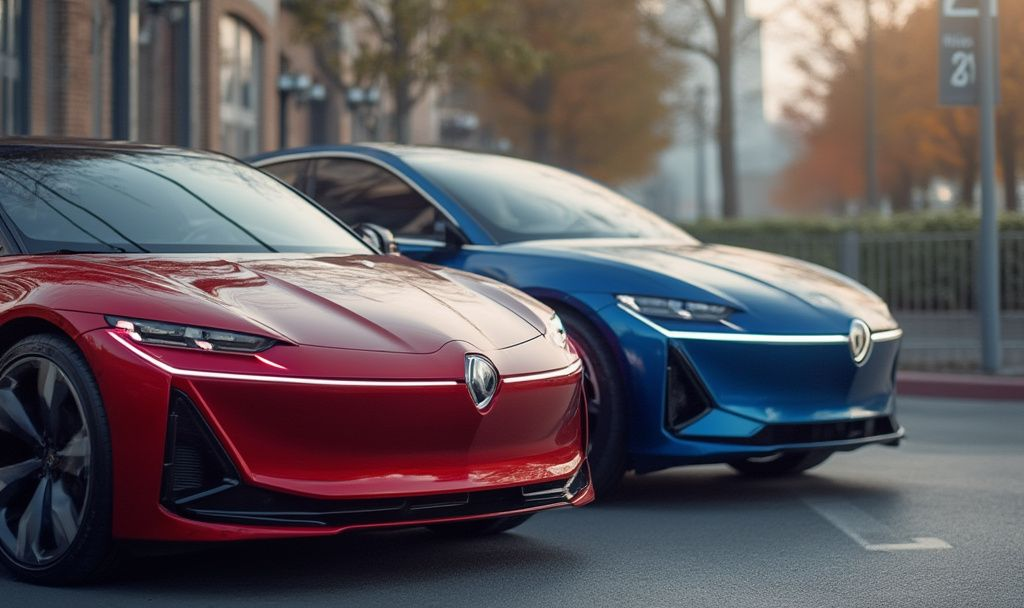Choosing between a sports car and a hybrid involves balancing thrill and responsibility. Potential buyers grapple with the allure of speed versus fuel economy and environmental impact. As hybrid sports cars evolve, they present a middle ground for those seeking both performance and sustainability in their driving experience.

Understanding the Trade-Offs Between Sports Cars and Hybrids
When it comes to choosing a new car, potential buyers often face a dilemma: should they opt for the exhilarating power of a sports car or the environmental and economic benefits of a fuel-efficient hybrid? This decision encompasses several factors, including speed, driving enjoyment, running costs, and environmental impact. Sports cars promise high performance and prestige, but may come with higher emissions and fuel costs. On the other hand, hybrids offer practicality and eco-friendliness, but may compromise on thrilling acceleration and a sporty driving experience.
Understanding these differences is crucial for car enthusiasts and environmentally conscious consumers alike. As more manufacturers explore hybrid sports cars, interest in these vehicles has grown. The ability to deliver impressive speed along with reduced emissions makes hybrid sports cars an appealing option for those who desire both performance and sustainability. Recent models even boast over 600 horsepower, achieving swift acceleration alongside the option for all-electric driving, which can be perfect for short commutes.
Exploring Why People Seek This Information
People often search for information about sports cars versus hybrids to resolve the conflict between the allure of performance and the responsibility of eco-consciousness. Some are in the market for a new vehicle and wish to weigh the pros and cons, while others are simply curious about evolving automotive technologies. The underlying question frequently is: “Can I have both power and efficiency?”
Frustrations arise when trying to balance excitement with practicality or when feeling torn between personal satisfaction and environmental responsibility. The decision could be stressful or lead to “eco-guilt” for those attempting to reconcile their love for fast cars with their desire to make greener choices. Some find solace in the fact that hybrid sports cars are increasingly becoming sophisticated enough to offer a compelling compromise.
Recent Trends and Industry Context
The automotive industry is in a state of rapid transformation, with traditional sports car manufacturers pivoting towards hybrid technology. Regulatory pressures and consumer demand for cleaner vehicles drive this shift. Brands like McLaren, Ferrari, and Chevrolet now feature hybrid models that maintain their hallmark speed advantages while embracing lower emissions. This trend is further emphasized by articles on hybrid popularity.
With interest in hybrid sports cars on the rise, consumers benefit from more model offerings that marry thrilling acceleration with eco-friendly credentials. The future might see even more powerful all-electric sports cars surpassing today’s hybrid options, providing an even greater blend of performance and sustainability.
Policy and Ethical Considerations
Ever-evolving environmental standards heavily influence the market for both sports cars and hybrids. To comply with these standards, traditional sports cars, notorious for high emissions, are under scrutiny unless they integrate hybrid or fully electric powertrains. Government incentives often tip the scales in favor of hybrids, offering tax credits and other benefits for choosing greener vehicles. These measures serve to encourage consumers and manufacturers alike to prioritize sustainability in their vehicular choices.
These policies are vital as they shape both consumer behavior and manufacturer strategies in the auto industry. Such discussions around hybrid versus gasoline cars highlight the cultural shift towards valuing eco-conscious performance vehicles, marking a pivotal moment in how society balances individual pleasures with collective environmental responsibility.
Cultural and Social Significance
The debate over whether to prioritize power or economy in cars also reflects broader societal trends. Choosing between a sports car and a hybrid is symbolic of larger values such as excitement versus responsibility and individuality versus environmental stewardship. Increasingly, media portray hybrid sports cars as aspirational objects, suggesting that one doesn’t have to sacrifice fun for eco-consciousness.
This societal shift affects human aspirations and identity, as well as perceptions of success. From expressing individuality through a luxury vehicle to aligning with green values by reducing one’s carbon footprint, the choice between these cars encapsulates various facets of modern life.
Useful Tools and Resources for Decision-Making
Fortunately, several resources can help individuals make informed choices between sports cars and hybrids. Car comparison tools, automotive review websites such as Carwow, Edmunds, and MotorTrend, and manufacturer configurators provide detailed insights into different models.
- Online car comparison tools and calculators
- Manufacturer configurators for hybrid and sports models
- Automotive review websites like Carwow, Edmunds, and MotorTrend
- Interactive quizzes for picking the right car type
Furthermore, owner forums discussing real-world trade-offs offer valuable firsthand experiences that can illuminate personal aspects of car ownership that are not always apparent through specs and statistics alone.
Frequently Asked Questions (FAQs)
What are the main differences between sports cars and hybrids?
Sports cars primarily offer high performance and driving enjoyment but are less fuel-efficient, while hybrids focus on sustainability and efficiency with lower emissions and fuel costs.
Why are hybrid sports cars gaining popularity?
Hybrid sports cars are increasingly popular because they combine impressive speed with reduced emissions, catering to those who desire both performance and environmental responsibility.
How do government incentives affect hybrid car purchases?
Government incentives often include tax credits and benefits, making hybrids more financially attractive to consumers and encouraging more eco-friendly vehicle purchases.
Which brands offer hybrid sports car models?
Brands like McLaren, Ferrari, and Chevrolet offer hybrid sports car models that maintain high performance while embracing lower emissions.
What tools can help me choose between a sports car and a hybrid?
Online car comparison tools, manufacturer configurators, and automotive review websites like Carwow and Edmunds can provide insights to help you decide.
